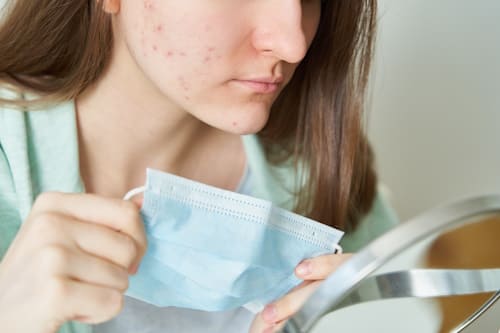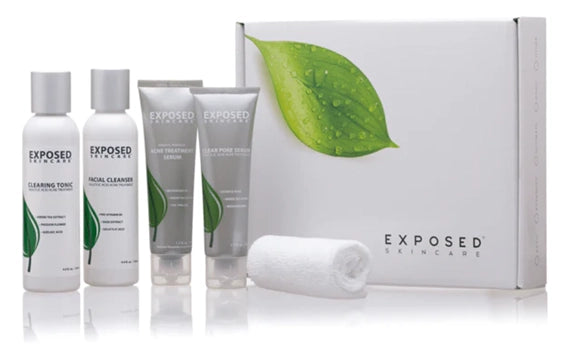Understanding the impact of different seasons on our skin is crucial. The question of whether "is acne worse in summer or winter?" has puzzled many.
Each season has unique challenges and effects on the skin, particularly for those with acne-prone skin. This guide will explore the nuances of acne management during these contrasting seasons and delve into effective skin care routines tailored for each.
Also read: How to choose the best acne treatment
Biggest Take-Aways:
- Seasonal changes significantly impact acne, with summer heat causing sweat-induced breakouts and winter dryness leading to irritated skin.
- Adjusting your skincare routine to the season, such as using lighter products in summer and more hydrating ones in winter, is crucial for managing acne.
- Lifestyle factors like diet, hydration, and stress management are vital in controlling acne throughout the year.
- Exposed Skin Care is a versatile and effective solution for managing acne in all seasons, addressing its root causes and symptoms through its comprehensive formula.

Seasonal Shift: How Seasons Affect Acne
Is Acne Worse in Summer or Winter? A Comparative Overview
Summer Months: Heat, Humidity, and Acne Breakouts
- Increased Sebum Production: The summer heat can stimulate the sebaceous glands, leading to more sebum and potential clog of pores.
- Sweat and Clogged Pores: Excessive sweating can mix with sebum and dead skin cells, causing clogged pores and breakouts.
- Use of Sunscreen and Acne: While essential, some sunscreen products can clog pores, exacerbating acne.
Winter Months: Cold Air, Dryness, and Skin Stress
- Dry Skin and Acne: The harsh winter conditions strip the skin of its natural oils, leading to dryness and potentially worsening acne.
- Indoor Heating and Skin Dryness: Indoor heating systems can further dehydrate the skin, impacting acne-prone areas.
- Less Exposure to Sunlight: Reduced sunlight can affect mood and skin health, indirectly impacting acne.
Summer Acne Management: Strategies to Prevent Summer Acne
Adjusting Your Skin Care Routine for Summer
- Choosing the Right Sunscreen: Opt for non-comedogenic and oil-free sunscreen to protect your skin without clogging pores.
- Regular Cleansing: Wash your face twice daily to remove excess oil and sweat, preventing summer breakouts.
- Light Moisturizers: Use a lightweight, non-greasy moisturizer to maintain hydration without clogging pores.

Lifestyle Adjustments for Summer Skin Health
- Stay Hydrated: Drink plenty of water in your skin and body.
- Wearing Breathable Clothing: Avoid tight, synthetic clothing that can trap sweat and irritate acne-prone skin.
- Dietary Considerations: Consume a balanced diet with reduced sugar and dairy intake, which can sometimes exacerbate acne.
Effective Acne Treatments for Summer
- Salicylic Acid and Benzoyl Peroxide: Incorporate acne treatments containing salicylic acid or benzoyl peroxide to target summer breakouts.
- Exfoliation: Gently exfoliate to remove dead skin cells and prevent clogged pores. Avoid over-exfoliation as it can do more harm than good.
Winter Acne Management: Navigating Through the Cold
Tailoring Your Skin Care Routine for Winter
- Intensive Moisturizers: Switch to a heavier moisturizer to lock in moisture and combat dryness without clogging pores.
- Gentle Cleansers: Use a hydrating cleanser that doesn't strip the skin of its natural oils.
- Limiting Hot Showers: Avoid long, hot showers as they can further dry out the skin, making winter acne worse.
Lifestyle Tips for Managing Winter Skin Care
- Humidifiers: A humidifier adds moisture to the air and help prevent skin dryness.
- Protecting Skin from the Cold: Wear scarves and other protective clothing to shield your skin from harsh winter winds.
- Balanced Diet and Hydration: Maintain a diet rich in omega-3 fatty acids and keep hydrated to nourish your skin from within.

Winter Acne Treatments
- Retinoids: Consider using retinoids, as they can effectively treat acne in the winter.
- Hydrating Topical Treatments: Look for topical treatments that hydrate while treating acne, such as those containing hyaluronic acid.
Understanding and Combating Seasonal Acne Flare-Ups
Recognizing the Signs of Seasonal Acne
- Identifying Seasonal Patterns: Pay attention to when your acne worsens. Does it align with seasonal changes?
- Reacting to Early Symptoms: Start adjusting your skincare routine as soon as you notice changes in your skin with the season.
Personalized Treatment Plans
- Customizing Skin Care: Tailor your skincare routine based on your unique skin type and how it reacts to seasonal changes.
- Continuous Monitoring: Regularly assess the condition of your skin and adapt your routine as needed.
Dealing with Persistent Seasonal Acne
- Consistent Skin Care: Stick to a consistent skincare routine, even when acne seems to improve.
- Effective Acne Products: Use proven acne treatment products that align with your skin's needs during different seasons.
The Role of Lifestyle in Managing Seasonal Acne
Diet and Hydration
- Impact of Diet on Acne: Understand how your diet can affect your skin condition, especially during season changes.
- Hydration: Ensure you drink enough water to keep your skin hydrated.

Exercise and Acne Management
- Regular Exercise: Maintain a regular exercise routine, but ensure you clean your skin properly post-workout to prevent breakouts.
- Showering After Exercise: Always shower after exercising to remove sweat and bacteria that can cause acne.
Stress Management
- Reducing Stress: Engage in stress-reducing activities, as stress can exacerbate acne.
- Mindfulness and Relaxation Techniques: Practice mindfulness and relaxation to keep stress levels in check.
The Advantages of Exposed Skin Care in Your Acne Treatment Plan
Integrating a comprehensive product like Exposed Skin Care can bring transformative benefits to your skin. It combines science and nature to address various acne-related concerns, from inflammation to blemish control.
Here's how Exposed Skin Care stands out:
- Targets the Root Cause: By penetrating deep into the hair follicle, it addresses acne at its source, preventing future breakouts.
- Reduces Inflammation: The product line is formulated with ingredients known to soothe and reduce skin inflammation, a key factor in acne flare-ups.
- Balances Moisture Levels: Exposed Skin Care ensures that your skin is adequately moisturized, which is crucial for maintaining the integrity of the skin barrier, especially in fluctuating weather conditions.
- Clears Existing Blemishes: Regular use helps clear existing pimples and blemishes, paving the way for clearer skin.
- Prevents Clogged Pores: It effectively keeps pores clear of excess oil and dead skin cells, preventing the formation of new acne.
Incorporating Exposed Skin Care into your routine, whether you're battling summer heat or winter dryness, can significantly enhance your journey towards clear, healthy skin, adapting seamlessly with your seasonal skin care strategies.
Conclusion
Understanding the complex relationship between acne and seasonal changes is crucial for anyone struggling with this common skin condition. While acne may worsen in the winter due to the harsh effects of winter weather, summer's heat and humidity can also wreak havoc on your skin.
It's evident that both seasons have their unique challenges - winter breakouts often arise from dryness and indoor heating, leading to more severe acne, while summer acne breakouts are typically fueled by sweat and oil, which can lead to clogged pores.
For those who experience moderate to severe acne, recognizing the triggers specific to each season is key. Acne tends to flare up when the skin is subjected to extreme conditions.
In the summer, the combination of heat and humidity can make breakouts worse, while the cold and dryness of winter could also exacerbate the situation. Appropriate skin care products, including those like Exposed Skin Care, can significantly assist in managing these seasonal variations.
Whether getting rid of dead skin cells in the summer or ensuring adequate moisture to combat winter dryness, each season demands a tailored approach. Remember, excessive skin problems in one season compared to another may indicate the need to adjust your routine.
Understanding the triggers and adapting your skin care regimen accordingly can help keep your skin clear and healthy throughout the year. Products like Exposed Skin Care can be a valuable part of this regimen, offering a balanced approach to tackling the ongoing struggle with acne.
FAQs
Is Acne Generally Worse in Summer or Winter?
Both seasons can worsen acne for different reasons. Summer acne is often due to heat, humidity, and sweat, leading to clogged pores, while winter acne can be triggered by dry air and indoor heating, causing skin dryness and irritation.
What Are the Best Skin Care Practices to Prevent Summer Acne Breakouts?
To prevent summer acne, use non-comedogenic sunscreen, wash your face regularly to remove sweat and oil, and opt for lightweight moisturizers. Also, staying hydrated and wearing breathable clothing helps.
How Can I Manage Acne Breakouts in the Winter?
Use a hydrating cleanser for winter acne, apply a heavier moisturizer to lock in moisture, and limit hot showers. Also, consider using a humidifier to add moisture to the air in your home.
What Role Does Diet Play in Acne Management?
Diet can impact acne, particularly foods high in sugar and dairy. A balanced diet with reduced sugar and dairy intake may help in managing acne.
How Can Exposed Skin Care Help in Managing Acne?
Exposed Skin Care targets the root cause of acne by penetrating deep into hair follicles. It reduces inflammation, balances moisture levels, clears blemishes, and prevents clogged pores, making it effective for both summer and winter acne.
















